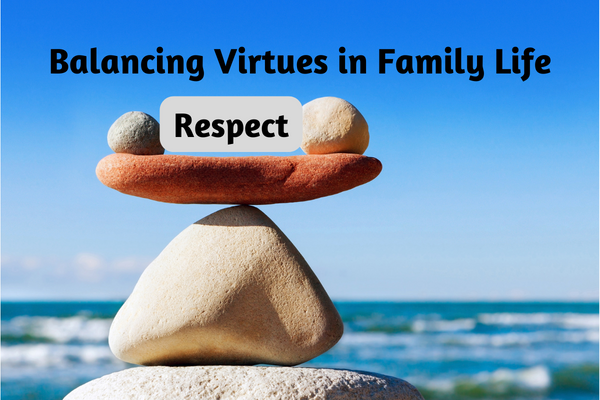Finding the Right Balance for Successful Families

Respect is an attitude of honoring ourselves and others as people of value.
What happens, though, if respect is overdeveloped or underdeveloped?
However, respect can manifest in less-than-ideal ways when taken to extremes, like any virtue. In this blog post, we will explore how respect can be overdeveloped or underdeveloped and discuss which virtues can help maintain a healthy balance.
Overdeveloped Respect:
-
-
Excessive Compliance: When respect is overdeveloped, it can lead to excessive compliance. Individuals may become so focused on respecting others’ opinions and wishes that they lose their own voice and identity. They may suppress their own needs and desires, which can eventually lead to feelings of frustration and unfulfilment.
-
Avoidance of Conflict: Overdeveloped respect might also result in an aversion to conflict at all costs. While conflict avoidance can benefit some situations, an excessive fear of disagreement can hinder healthy discussions and problem-solving.
-
Perfectionism: Overly respectful individuals might strive for perfection in their interactions, fearing that any mistake or misstep will be disrespectful. This can lead to anxiety and self-doubt, preventing personal growth and learning from experiences.
-
Underdeveloped Respect:
-
-
Disregard for Others: On the other hand, underdeveloped respect manifests as a complete disregard for others. This extreme can lead to rudeness, insensitivity, and a lack of empathy. It erodes trust and damages relationships.
-
Intolerance: Underdeveloped respect may result in intolerance for diversity and differing opinions. It can breed prejudice, discrimination, and conflict as individuals fail to acknowledge the inherent value in every person’s perspective.
-
Environmental Neglect: When respect for the Earth and all living things is underdeveloped, it can lead to environmental degradation and disregard for the consequences of our actions on the planet.
-
Balancing Virtues:
To keep the virtue of respect in balance, several other virtues can be particularly helpful:
-
-
Wisdom: Wisdom helps us discern when to speak up and when to listen, avoiding both excessive compliance and disregard for others.
-
Courage: Courage empowers us to address conflicts respectfully and assertively without fear of disrespecting others or compromising our values.
-
Empathy: Empathy allows us to understand and appreciate diverse perspectives, bridging the gap between overdeveloped and underdeveloped respect.
-
Humility: Humility reminds us that we are not infallible, and it’s okay to make mistakes. It keeps us from falling into the perfectionism trap.
-
Gratitude: Gratitude reminds us to respect the Earth and all living things by appreciating the interconnectedness of all life
-
When balanced with other virtues like wisdom, courage, empathy, humility, and gratitude, respect is a virtue that can foster healthy relationships, a harmonious society, and a deeper connection to the world around us. It’s essential to recognize when respect becomes excessive or insufficient and strive for a harmonious and balanced approach in our daily lives.
Respect is crucial in family dynamics, especially when children are involved. In fact, as I started this investigation into respect, it was hard to believe that you could have too much respect. Let’s explore how respect can be overdeveloped or underdeveloped within a family context and discuss which virtues can help parents maintain a healthy balance.
Overdeveloped Respect in a Family:
Here’s what overdeveloped respect might look like in a family:
-
-
Excessive Control: An overdeveloped sense of respect in parents can sometimes lead to excessive control. Parents might be so focused on maintaining order and discipline that they inadvertently stifle their children’s independence and personal growth.
-
Lack of Expression: In some cases, overemphasizing respect may discourage children from freely expressing their thoughts and emotions. Kids may feel pressured to conform to their parent’s expectations, resulting in an inability to assert themselves or communicate openly.
-
Perfectionism: Parents striving for perfect parenting, driven by an exaggerated sense of respect, may inadvertently create an environment where children fear making mistakes. This can hinder their ability to learn from experiences and develop resilience.
-
Underdeveloped Respect in a Family:
Here’s what underdeveloped respect might look like:
-
-
Disregard for Feelings: An underdeveloped sense of respect within a family can manifest as disregarding children’s feelings and opinions. Parents may dismiss their children’s thoughts, leading to resentment and a sense of insignificance in the young.
-
Lack of Boundaries: In some cases, underdeveloped respect may result in a lack of boundaries within the family. Children may grow up without a clear understanding of respect for personal space, time, or belongings, leading to conflicts and insecurity.
-
Inconsistent Discipline: Parents with an underdeveloped sense of respect may struggle with consistent discipline. This inconsistency can confuse children, making it challenging to understand the consequences of their actions and the importance of respecting rules.
-
Balancing Respect:
To maintain a balanced approach to respect within a family, consider these virtues:
-
-
Communication: Open and honest communication with children fosters a sense of respect for their opinions and feelings. It allows parents to strike a balance between guidance and autonomy.
-
Empathy: Empathy enables parents to connect with their children on an emotional level, validating their experiences and fostering mutual respect.
-
Boundaries: Establishing and respecting boundaries within the family teaches children the importance of personal space and respect for others’ needs.
-
Patience: Patience helps parents avoid excessive control and encourages them to allow children to learn from their mistakes.
-
Responsibility: Encouraging children to take responsibility for their actions and decisions helps them understand the consequences of their behavior and learn respect for rules and boundaries.
-
Respect within a family is a delicate balance that requires parents to avoid extremes of control or neglect while nurturing open communication, empathy, boundaries, patience, and responsibility. By embracing these virtues, parents can create a loving and respectful family environment that promotes their children’s healthy growth and development, ultimately strengthening family bonds and preparing the next generation for a respectful and harmonious world.
Respect is the one virtue every parent wants from their children. Let’s delve into the characteristics of overdeveloped and underdeveloped respect in children and how parents and caregivers can guide them toward a balanced understanding of this essential virtue.
Overdeveloped Respect in Children:
-
-
- Excessive Obedience: Overdeveloped respect may manifest as overly obedient children, often to the point of suppressing their own thoughts, desires, and individuality. They may become people-pleasers, always seeking approval from others, even if it goes against their own well-being.
- Fear of Disagreement: Children with an overdeveloped sense of respect might fear disagreement or confrontation. They may avoid expressing their opinions or asserting themselves in situations where it’s necessary, fearing that it might be disrespectful.
- Perfectionism: An overemphasis on respect can lead to perfectionism in children. They may believe that making any mistake is disrespectful and strive for unrealistic standards, leading to anxiety and self-criticism.
-
Underdeveloped Respect in Children:
-
-
- Disregard for Others: On the contrary, underdeveloped respect in children can manifest as a disregard for the feelings, needs, and boundaries of others. They may act in ways that are rude, insensitive, or even hurtful towards peers, siblings, or adults.
- Intolerance: Children with underdeveloped respect may exhibit intolerance towards those who are different from them. This can lead to prejudiced attitudes, bullying, or exclusion of others based on race, gender, religion, or other differences.
- Inability to Listen: These children may struggle with listening attentively and empathetically when others speak. They may interrupt, dismiss, or ignore the perspectives and emotions of those around them.
-
Balancing Respect in Children:
Balancing respect in children involves guiding them toward a healthy understanding of this virtue:
-
-
- Teach Assertiveness: Encourage children to express their thoughts and feelings respectfully. Teach them it’s okay to disagree as long as it’s done with kindness and consideration for others.
- Model Respectful Behavior: Children learn by example. Demonstrate respectful behavior in your interactions with them and with others in your life. Show them how to disagree without being disrespectful.
- Empathy Education: Help children develop empathy by discussing the feelings and perspectives of others. Encourage them to imagine how someone else might feel in various situations.
- Encourage Critical Thinking: Foster critical thinking skills in children so they can assess situations and make decisions that align with their values while respecting the rights and feelings of others.
- Promote Diversity: Expose children to different cultures, backgrounds, and beliefs. Emphasize the value of diversity and the importance of treating everyone with kindness and respect, regardless of differences.
-
In essence, cultivating balanced respect in children involves empowering them to express themselves assertively, develop empathy, and appreciate diversity while ensuring they understand the importance of treating others with kindness, dignity, and consideration. This balanced approach helps them navigate the complexities of social interactions and contributes to their overall development as respectful individuals.
I invite you to sign up for our newsletter. It is a great way to get the Virtue of the Month and tips on relationships, parenting, and self-care. In addition, you’ll be the first to know about upcoming classes for successful families.
To sign up, visit the “Newsletter” section here on the website. Enter your email address, and you’ll receive our newsletter in your inbox on Wednesdays. I appreciate your interest in bringing out the best in your children and yourself. We look forward to keeping you informed through our newsletter!

